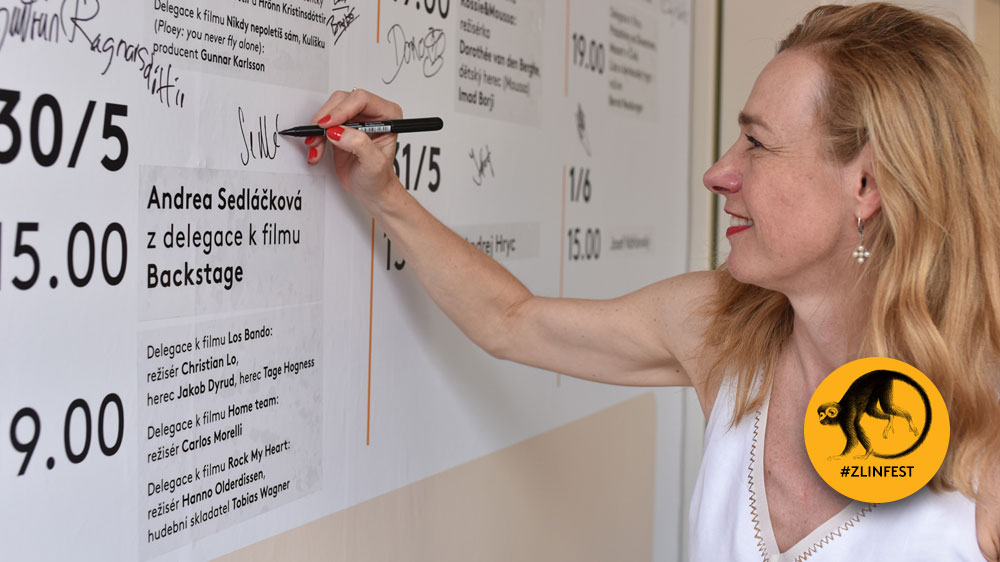Andrea Sedláčková about Backstage: Talent Shows Are Tough and Passing World
The feature film "Backstage" will hit Czech cinemas on June 7, 2018. It was directed by Andrea Sedláčková, author of the award-winning drama Fair Play. Backstage will introduce an entirely new genre of dance film to Czech film. In addition to the actors and the story, rhythm, music and dance choreography play a big role in it.

The film brings an entirely new genre to the Czech film - a dance film. Why did you choose to go for this genre?
Just because it's something completely different from what I have been doing before. A dance film is a film relaying on visuals. Visual emotionality is the alpha and omega of this genre, and I have been filming psychological films so far, so I enjoyed using original means of expression that were new to me and describing a completely different world, the world of hip-hop, which is an artistic and at the same time natural expression of the need for freedom and self-realization. When I saw The Pastels - our main protagonists – on stage, I was excited. Their energy, joy of life and movement, freedom, original creativity. No wonder they are models for many young people.
The film tells a story from the world of dance, specifically hip-hop, and also about what is behind the scenes of television talent contests. Was it difficult to familiarize yourself with this environment? How did you prepare for the shooting?
When I read the first version of the script, it seemed to me that it was exaggerated and that it could not be as bad as it said. And I started meeting people working in this area - directors, choreographers, jurors. And I found that the reality is even worse and that it is really a tough world. And very often, as the film shows, the competitions are partially manipulated. The greatest talent may not always win, sometimes it is those who have some degree of attractiveness for the viewer, whether with their life story, or for example, their clumsiness that impresses the audience and with which they can identify. Often, the audience favour the weaker ones and the competition dramaturgists know it, and so they sometimes push such contestants into the finals, though they would not deserve to be there. And then I also attended the shooting of these competitions, watched behind the scenes, wrote notes. Some juror’s dialogues are for example inspired by reality.
Have you been surprised by anything behind the scenes and the course of talent competitions?
Yes. By the fact how passing this world is. A budget for such TV is equal or sometimes even higher than that for a feature film. But films last much longer, they are screened in cinemas, on television, travel to festivals, you can view them after many years. The contest is interesting only on the evening when it is broadcast, then never again. As one of the directors told me, nothing gets older faster than a TV contest, because this genre is developing visually very fast, changing all the time. What seemed modern yesterday is funny tomorrow.
What was the hardest thing during the shooting?
Probably working with both professional and amateur actors. The Pastels dancers are very authentic in their acting, but it's a different kind of acting than professional actors. And also to convince the dancers that they do not play themselves, but characters, and so they can be unsympathetic at times, or wearing different clothes than they would normally wear. And then tie the dance scenes with the story and balance them so that the dance does not devour the story. Shooting is always a bit like a military operation, but this was a big battle. Especially from an organizational point of view. For example, scenes from the TV show were filmed for three days, during which twenty actors appeared on the stage together with eighty dancers who needed all needed to be quickly made-up and dressed. Not to speak of the fact that they need to rehearse their numbers, which must be perfectly lit, everything must be prepared to the millimetre. We had one hundred and fifty extras and two shooting crews - cinema and television, the TV crew having nine cameras. We had about one hundred people in the crew. It was three days full of adrenaline, but great days, because in the end everything worked!
What are your next plans? Do you already have a new film in your head?
Yes, I have already started writing the script. It will be a totally different genre, you will be surprised...